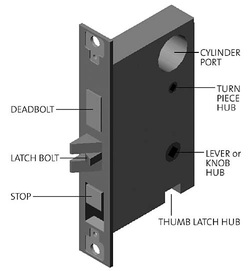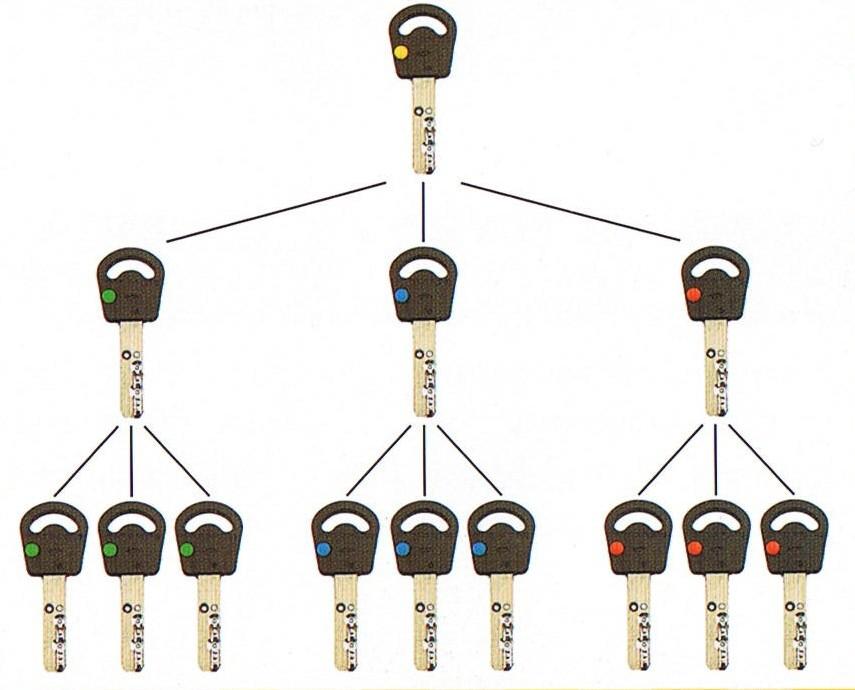
A traditional locking system is the mortise lock, one of the earliest locking systems, which was developed before the cylindrical locks. It is a type of locking system which requires an actual mortise (a pocket for the lock) to be cut into the door for the lock to be installed. They are still widely used throughout Europe.
Mortise locks consist of a body which is the actual lock fitted in the pocket of the door. It also has a trim which is the visible part, such as the doorknob, handle, pull, etc. which come in a multitude of designs. Then there is the mortise strike plate, which is placed around the hole cut into the door frame, where the bolt of the lock actually locks in. Finally, there is a mortise key cylinder, which is the mechanism allowing to perform the locking and unlocking with a key.
In most cases, the mortise lock and the strike plates are already mounted in the readymade doors and frames, but sometimes, the locksmiths will be asked to install a mortise lock on a new door, which requires certain woodwork and exact measurements as well. Specialized instruments to cut the pockets in the door and the door frame will be needed, as well as measurement devices to ensure that they are made at the precise places, so as to fit the mortise lock. This is crucial in order for the door to remain undamaged, and for the lock to work properly. The solid mechanism of the mortise lock makes it much more stable and secure than the bored cylindrical locks. These types of locks offered by some locksmiths actually encompass a double locking function – both as a dead bolt and a door knob for your door.
Mortise locks consist of a body which is the actual lock fitted in the pocket of the door. It also has a trim which is the visible part, such as the doorknob, handle, pull, etc. which come in a multitude of designs. Then there is the mortise strike plate, which is placed around the hole cut into the door frame, where the bolt of the lock actually locks in. Finally, there is a mortise key cylinder, which is the mechanism allowing to perform the locking and unlocking with a key.
In most cases, the mortise lock and the strike plates are already mounted in the readymade doors and frames, but sometimes, the locksmiths will be asked to install a mortise lock on a new door, which requires certain woodwork and exact measurements as well. Specialized instruments to cut the pockets in the door and the door frame will be needed, as well as measurement devices to ensure that they are made at the precise places, so as to fit the mortise lock. This is crucial in order for the door to remain undamaged, and for the lock to work properly. The solid mechanism of the mortise lock makes it much more stable and secure than the bored cylindrical locks. These types of locks offered by some locksmiths actually encompass a double locking function – both as a dead bolt and a door knob for your door.
Even though the mortise locks go far back in time, some locksmiths still use this old but effective locking system when installing new locks for the home or other premises. The mortise lock is the type of lock you can still find in some older buildings and has its benefits, tested by time.
Residential locksmiths will offer mortise locks, which are built in the doors, or installed in the doors, and which have quite a complex structure of different levels and notches. This complex structure makes these mortise locks very secure ones, because of the time and skills it is necessary for unwanted intruders and burglars to break in. Good quality mortise locks installed by a good residential locksmith will ensure a high level of security to your home.
Mortise locks are still preferred by some locksmith specialists and clients because of the wide variety of them available on the market. There are really simple and cost-effective ones, and at the same time there are mortise locks, with very complex constructions, double locking and other functions, which again make them highly reliable and secure.
Some clients prefer the mortise locks for their gates and doors, because of their style and vintage charm. This is probably the reason why mortise locks have become once again so popular in the US up market property (both business and residential).
Residential locksmiths will offer mortise locks, which are built in the doors, or installed in the doors, and which have quite a complex structure of different levels and notches. This complex structure makes these mortise locks very secure ones, because of the time and skills it is necessary for unwanted intruders and burglars to break in. Good quality mortise locks installed by a good residential locksmith will ensure a high level of security to your home.
Mortise locks are still preferred by some locksmith specialists and clients because of the wide variety of them available on the market. There are really simple and cost-effective ones, and at the same time there are mortise locks, with very complex constructions, double locking and other functions, which again make them highly reliable and secure.
Some clients prefer the mortise locks for their gates and doors, because of their style and vintage charm. This is probably the reason why mortise locks have become once again so popular in the US up market property (both business and residential).

 RSS Feed
RSS Feed